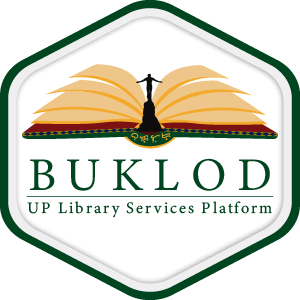



From the trailblazers of the knowledge path come its centennial offering to the UP community, Buklod.
Buklod is a next-generation library management system, often referred to as Library Services Platform (LSP), custom-developed to best serve the needs and requirements of the UP Libraries and its clients. It was designed to serve as a union catalog of all information resources found in the different libraries across the UP System to support cooperative cataloging and resource sharing among these participating institutions.
It has the core components of an Integrated Library System (ILS), but unlike the latter, which was primarily designed for the management of print collections, it was developed to support the management of both print and digital collections and takes advantage of the latest advances in computing technologies and architecture, particularly in the areas of cloud computing and Web services application programming interfaces (APIs).
Alongside the Tuklas: the UP Library Discovery Service, where one can access information about the library print, non-print, and digital collection and its subscribed journals in one portal; Buklod is the platform where bonafide users can transact with the library. Through its single sign-on capability, UP students, faculty, and staff may reserve books online, declare lost items, and view their current and previous transactions in any of the participating libraries at any remote location by simply logging-in using their UP Mail accounts.
For the UP Libraries, Buklod serves as the principal application for most of its functions through its circulation, cataloging, serials management, acquisitions, and inventory modules. More importantly, it plays a unifying and cost-efficient role as it integrates the bibliographic data, patron accounts, and transaction records of participating University Libraries of the UP. Through this breakthrough, it allows the UP Libraries to achieve harmonization of their collection development function as each CU could be more inclined to allocate its budget to acquire the titles intended for their respective core disciplines.
The name of the platform itself, Buklod, means bond; the act of union. It symbolically conveys the union of library systems and information resources of participating University Libraries of UP in one platform. This act of “pagbubuklod” brings about the harmonization and working together of the participating University Libraries toward the common goal of providing nothing short of the best resources and services to the UP community.
The logo of Buklod is an open book, which symbolizes the UP Library as an institution; while its leaves represent the different participating libraries in the University. The Baybayin of the word Buklod is inscribed at the footband of the book which functionally holds the book together. This and the image of the Oblation symbolically signify the union, harmonization, and working together of the libraries. The colors Maroon, Green, and Yellow as well as the elements of the Sablay were added to convey the sense of being UP. These group of images together with the word mark BUKLOD: UP Library Services Platform are encapsulated within a hexagon to accentuate its technological attribute and convey the potential for collaboration among the UP Library in consonance with its metaphor of “representing potentials for life”.
At its essence, Buklod encapsulates the core principles of innovation and creativity. It demonstrates how the UP Library constantly sought ways to better approach reality and remain relevant; even to the extent of yielding one’s own brainchild, the iLib; yet producing an even greater masterpiece.
---
Credits and Acknowledgements: Buklod: UP Library Services Platform was developed by Chito N. Angeles, former University Librarian of UP Diliman, with the help of the members of the Committee on Information Systems Implementation and Technical Support of the University Library Diliman. Logo and other images courtesy of John Christopherson LT. Fredeluces, Kristine Joy C. Jaromamay, and Angelo Emmanuel P. Ho.
---
Written by: Ma. Esmeralda Abarabar and Aaron Paul Madriñan (Strategic Communication, Research and Marketing Section, University Library, UP Diliman).